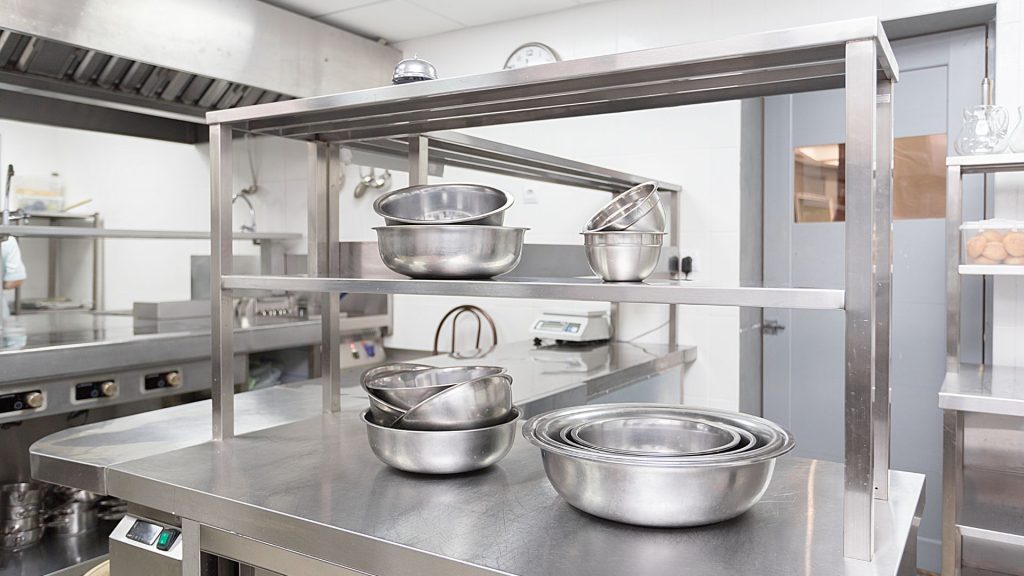Old restaurant equipment can take up valuable space, collect dust, and even become a safety hazard if not handled properly. From worn-out ovens and broken refrigerators to outdated fryers and mixers, every piece eventually reaches the end of its useful life. Knowing how to safely dispose of old restaurant equipment is essential for maintaining a clean, compliant, and efficient commercial kitchen.
Many restaurant owners overlook the importance of proper disposal, unaware that some materials contain hazardous components or can actually be recycled for profit. Responsible disposal not only helps protect the environment but also keeps your workspace organized and ready for new upgrades. Whether you’re replacing appliances or closing down a kitchen, safe removal ensures you meet regulations while promoting sustainability.
Understanding When Old Restaurant Equipment Needs Replacement
Recognizing when old restaurant equipment has reached the end of its service life is vital to maintaining kitchen efficiency and safety. Over time, appliances like fryers, ovens, and refrigerators lose performance, consume more energy, and pose operational risks. Warning signs include frequent breakdowns, higher utility bills, inconsistent temperatures, and safety hazards such as leaks or faulty wiring. Holding onto malfunctioning machines can slow food preparation, reduce quality, and impact customer satisfaction.
Restaurant owners should schedule regular inspections to assess the condition of their appliances and plan replacements before total failure occurs. Upgrading or removing old restaurant equipment not only boosts productivity but also prevents costly emergency repairs. By acting proactively, you ensure your staff works in a safer, more reliable environment while keeping the business running smoothly. Recognizing the right time for disposal is the first crucial step toward sustainable kitchen management.
The Environmental Impact of Improper Equipment Disposal
Throwing old restaurant equipment into regular waste bins or landfills can have serious environmental consequences. Many appliances contain metals, oils, plastics, and refrigerants that can leak harmful chemicals into the soil and water. This contamination poses long-term risks to wildlife and human health. Responsible disposal helps minimize these negative effects while conserving natural resources.
Recycling valuable materials like stainless steel, aluminum, and copper from old restaurant equipment reduces the demand for raw mining. Additionally, proper waste processing lowers greenhouse gas emissions associated with manufacturing new materials. Restaurant owners have a moral and legal responsibility to handle disposal in an eco-conscious way. Working with certified recycling centers or disposal services ensures hazardous components are handled safely. By prioritizing sustainability, your restaurant sets a positive example for the industry and the community while protecting the environment from unnecessary harm.
How to Identify Recyclable Parts in Old Restaurant Equipment
Many restaurant owners are surprised to learn how much of their old restaurant equipment can be recycled instead of discarded. Common kitchen appliances often contain recyclable materials like steel frames, copper wiring, aluminum panels, and certain types of plastics. Before sending equipment away, take time to identify which components can be separated and reused. For instance, stainless steel from sinks, cooking surfaces, and shelving is highly valuable to recycling facilities.
Refrigeration units may contain hazardous refrigerants that require special removal before recycling. Working with an experienced technician or metal recycling expert can help you determine what can be salvaged safely. Properly identifying recyclable parts not only helps the environment but also allows you to recover potential value from scrap materials. This process transforms disposal into a more sustainable and financially beneficial practice while ensuring that old restaurant equipment is handled responsibly.

Partnering with Local Scrap and Metal Recycling Centers
Collaborating with local recycling centers is one of the best ways to responsibly dispose of old restaurant equipment. These facilities specialize in dismantling large appliances, separating metals, and processing them for reuse in new products. Instead of sending your old equipment to the landfill, recycling centers help turn waste into valuable materials. Contact local scrap yards or metal recycling companies to learn their requirements for collection or drop-off. Some may even offer pickup services for heavy items like ovens, stoves, or industrial dishwashers.
By partnering with these facilities, restaurant owners can ensure their disposal process meets local environmental standards and contributes to sustainable manufacturing. Additionally, selling scrap metal can offset the costs of new equipment purchases. Building a relationship with reliable recycling centers promotes ongoing eco-friendly operations and positions your business as a responsible participant in your community’s waste management efforts.
Donation Options for Usable Old Restaurant Equipment
Not all old restaurant equipment needs to be scrapped or discarded. Many appliances, furniture, and utensils still in working condition can be donated to charitable organizations, culinary schools, or smaller restaurants just starting out. Donating helps extend the lifespan of usable equipment while reducing waste and storage clutter. It’s a meaningful way to support local businesses and community programs that may not have the budget for new kitchen gear.
Before donating, ensure all items are cleaned, functional, and safe for continued use. Some non-profit organizations even arrange pickups for large donations, making the process easier. Additionally, donations can offer tax benefits for your business, making it a smart financial choice alongside its social value. Choosing to donate your old restaurant equipment creates a positive environmental and community impact, turning what might have been wasted into a resource that supports others in the food industry.
Proper Handling and Storage Before Equipment Removal
Before disposing of old restaurant equipment, proper handling and storage are essential to ensure safety and prevent damage. Large kitchen appliances often contain sharp edges, electrical wiring, and heavy components that can pose injury risks during transport. Always disconnect electrical and gas connections carefully and follow manufacturer instructions for decommissioning. Cleaning equipment thoroughly before storage prevents the buildup of grease and odors.
If removal cannot occur immediately, store items in a dry, well-ventilated space to prevent rust or deterioration. Labeling and organizing each item helps streamline the pickup or recycling process later. Proper handling also ensures that recyclable or reusable components remain intact, maintaining their potential value. Taking these precautions demonstrates professionalism and care for both your staff and the environment. By managing old restaurant equipment responsibly from removal to disposal, you create a safer and more efficient transition within your business operations.
Compliance with Local Waste Disposal Regulations
Every city or region has specific regulations governing the disposal of old restaurant equipment. Non-compliance can lead to fines, penalties, or environmental violations. Before getting rid of any kitchen appliance, it’s important to understand your area’s waste management rules. Some municipalities require permits for large-scale equipment removal, while others have designated recycling programs for metals and electronics.
Hazardous materials like refrigerants, oils, or electronic components must be handled by certified professionals to ensure safety. Working with a licensed waste disposal company can help you navigate these requirements easily. Maintaining proper documentation, such as receipts or recycling certificates, is also useful for business records and sustainability reporting. Staying compliant not only protects your business legally but also reinforces your commitment to responsible environmental practices. Following the right disposal regulations ensures that every piece of old restaurant equipment is managed in accordance with community and environmental standards.
Hiring Professionals for Heavy Equipment Hauling
Removing large and bulky kitchen appliances requires specialized skills and tools that most restaurant staff do not have. Hiring professional haulers ensures that old restaurant equipment is removed safely and efficiently without causing damage to your property. These experts have the proper lifting equipment, transport vehicles, and safety gear to handle heavy or awkward items like ovens, freezers, and stoves.
Professional services also understand how to dispose of appliances responsibly, often collaborating with recycling facilities or donation centers. This saves you time, prevents workplace injuries, and guarantees that your equipment ends up in the right place. Many haulers provide flexible scheduling and even offer dismantling services if items need to be broken down before transport. Relying on trained professionals gives peace of mind that the entire removal process is handled correctly, keeping your restaurant compliant and ready for upgrades or renovations without unnecessary hassle.
Preparing Your Kitchen Space for New Equipment Installation
Once old restaurant equipment is removed, preparing your kitchen for new installations is the next crucial step. Clearing the space allows for thorough cleaning and inspection of plumbing, electrical, and ventilation systems. This stage helps identify any maintenance issues that might interfere with new appliance performance. It’s also a good opportunity to reorganize your kitchen layout for improved workflow and efficiency.
Measure the available space carefully to ensure new equipment fits properly and meets safety standards. Updating wiring, flooring, or wall protection might also be necessary, especially if heavy or heat-generating machines were previously installed. Proper preparation minimizes installation delays and reduces the risk of future breakdowns. A clean, well-prepared environment ensures your new investments operate at their best. Treating this process with attention and care transforms your workspace into a refreshed, compliant, and productive culinary environment ready to serve customers effectively.
Conclusion
Safely disposing of old restaurant equipment is more than just a task—it’s a responsibility that protects your business, your staff, and the environment. Every piece of equipment, from fryers to refrigerators, must be handled properly to prevent waste, pollution, and unnecessary expenses. Whether it’s recycling valuable metals, donating usable items, or working with certified disposal experts, responsible management ensures your kitchen stays compliant and efficient. If you’re unsure where to start, let Mobile Dump Junk Removal in Ventura, CA take care of it for you. Our team specializes in professional hauling and environmentally conscious disposal for commercial kitchens of all sizes. Call us today at 18057513744 or email mobiledumpremoval@gmail.com to schedule a convenient pickup and keep your restaurant space clean, safe, and ready for the next upgrade.
